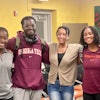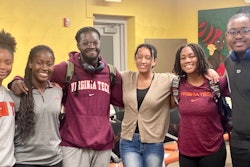Dr. Sophia Rahming is helping to revolutionize peer-to-peer learning at Florida State University (FSU).
As associate director of the university’s Center for Advancement of Teaching, Rahming oversees FSU’s Learning Assistant Program, which has yielded impressive results in helping students excel in some of the school’s high-enrollment, lower-division courses that provide the foundation for learning in late courses.
 Dr. Sophia Rahming
Dr. Sophia Rahming
The Learning Assistant (LA) model program is not new. It was originally conceived and developed at the University of Colorado Boulder and has since grown to more than 120 other colleges. The concept is quite simple. Undergraduate LAs operate as part of an instructional team, supporting both students and faculty to create more inclusive, learner-centered classrooms that improve student and faculty success. At FSU, the program has also worked to increase access to STEM majors.
“My goal is to have the LAs look like the students in the courses,” says Rahming. “When that happens, they’re more willing to reach out.”
Undergraduate students who earn a ‘B’ or above in one of the offered courses — usually in the STEM fields — are recruited and offered a paid job to work with other students enrolled in that same course.
“We find that student success has increased,” says Rahming, whose scholarly research centers on the STEM-related experiences of Afro-Caribbean women and other women of color in STEM education and careers.






















